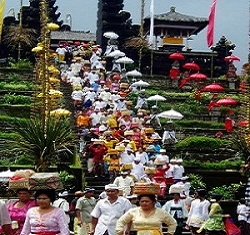Besakih Temple
 Besakih Temple is the biggest Hindu temple in Bali which the local people call Pura Besakih.
It owns beautiful view from the top of temple area where we can see the
wide nature panorama until to the ocean so that way this temple is many
visited by tourists from all over the world. Besakih Temple is located
in Besakih countryside, Rendang sub district, Karangasem regency, east
part of the island. It is located in southwest side bevel of mount
Agung, the biggest mounts in Bali. It is because pursuant to Agung Mount
confidence is holiest and highest mount in Bali Island.
Besakih Temple is the biggest Hindu temple in Bali which the local people call Pura Besakih.
It owns beautiful view from the top of temple area where we can see the
wide nature panorama until to the ocean so that way this temple is many
visited by tourists from all over the world. Besakih Temple is located
in Besakih countryside, Rendang sub district, Karangasem regency, east
part of the island. It is located in southwest side bevel of mount
Agung, the biggest mounts in Bali. It is because pursuant to Agung Mount
confidence is holiest and highest mount in Bali Island.
Bali’s “mother temple”,Besakih temple,
is over 900 metres up the slopes of Gunung Agung. It has been regarded
as a holy place since pre-historic times in Bali. The first recorded
mention of its existence is from an inscription that dates from 1007
A.D. Since the Gelgel dynasty of the fifteenth century it has been
regarded as a central, holy temple for the entire island.
All the allegiances of the Balinese people come together at Besakih. Each regency has its own temple within the over-all compound, as do each of the caste groups. There is a total of 18 separate sanctuaries. The three main temples are : Pura Penataran Agung, Dedicated to Sang Hyang Widi Wasa : Pura Kiduling Kreteg, dedicated to Brahma; and Pura Batu Madeg, dedicated to Wisnu.
All the allegiances of the Balinese people come together at Besakih. Each regency has its own temple within the over-all compound, as do each of the caste groups. There is a total of 18 separate sanctuaries. The three main temples are : Pura Penataran Agung, Dedicated to Sang Hyang Widi Wasa : Pura Kiduling Kreteg, dedicated to Brahma; and Pura Batu Madeg, dedicated to Wisnu.
To the Balinese a visit to the temple sanctuaries at Besakih temple
is a special pilgrimage. Each temple has its own odalan, or anniversary
celebration, and on the full moon of the Balinese month “Kedasa” the
entire compound of Besakih celebrates the visit of the gods, with an
enormous throng of visiting pilgrims.
 The Besakih's name is come from the word of Basuki, the old language from Sanskrit Wasuki,
and then it become the Ancient Java Language. In this Sanskrit, the
Basuki means congratulation. In mythology of Samudramanthana has
mentioned that Basuki is a dragon that twines the Mount Mandara. The
omission has come from tradition megalithic which had been indicated
that it had to be sanctified place. It seems, the Besakih temple
is coming from very old era which is far before the existence of
Hinduism influence. Hereinafter, an Ancient Bali king of Sri Kesari
Warmadewa found the Merajan Selonding Temple in this temple complex
area. He also commands to build the Blanjong Monument that is located
in Sanur Village. The Besakih Temple
complex is built pursuant to cosmos balance. It is based on the nature
conception which is disseminating the fundamental temple complex that is
arranged to pursuant of the way direction. So, this building can
deputize nature as symbolic of the world balance existence.
The Besakih's name is come from the word of Basuki, the old language from Sanskrit Wasuki,
and then it become the Ancient Java Language. In this Sanskrit, the
Basuki means congratulation. In mythology of Samudramanthana has
mentioned that Basuki is a dragon that twines the Mount Mandara. The
omission has come from tradition megalithic which had been indicated
that it had to be sanctified place. It seems, the Besakih temple
is coming from very old era which is far before the existence of
Hinduism influence. Hereinafter, an Ancient Bali king of Sri Kesari
Warmadewa found the Merajan Selonding Temple in this temple complex
area. He also commands to build the Blanjong Monument that is located
in Sanur Village. The Besakih Temple
complex is built pursuant to cosmos balance. It is based on the nature
conception which is disseminating the fundamental temple complex that is
arranged to pursuant of the way direction. So, this building can
deputize nature as symbolic of the world balance existence.
As
we familiarize, that the point direction way like East, South, West,
North, and middle as center point and each direction is named by
Mandala. In Hindu philosophy, Panca Dewata is manifestation of Siwa God.
Like Penataran Agung Temple
as center, we find in its courtyard conception show the solidarity
conception between the original Indonesia culture namely tradition
megalithic in form of Punden Berundak-undak with the Hinduism concept.
The ancient omissions which is existing in Besakih Temple complex can be
classified into 2 types those are omission pertained by megalithic
tradition and classic era. Besakih Temple beside as the altar for Hindu people in Bali, it is also as tourist destination which is a lot of visited by tourists.

Tidak ada komentar:
Posting Komentar